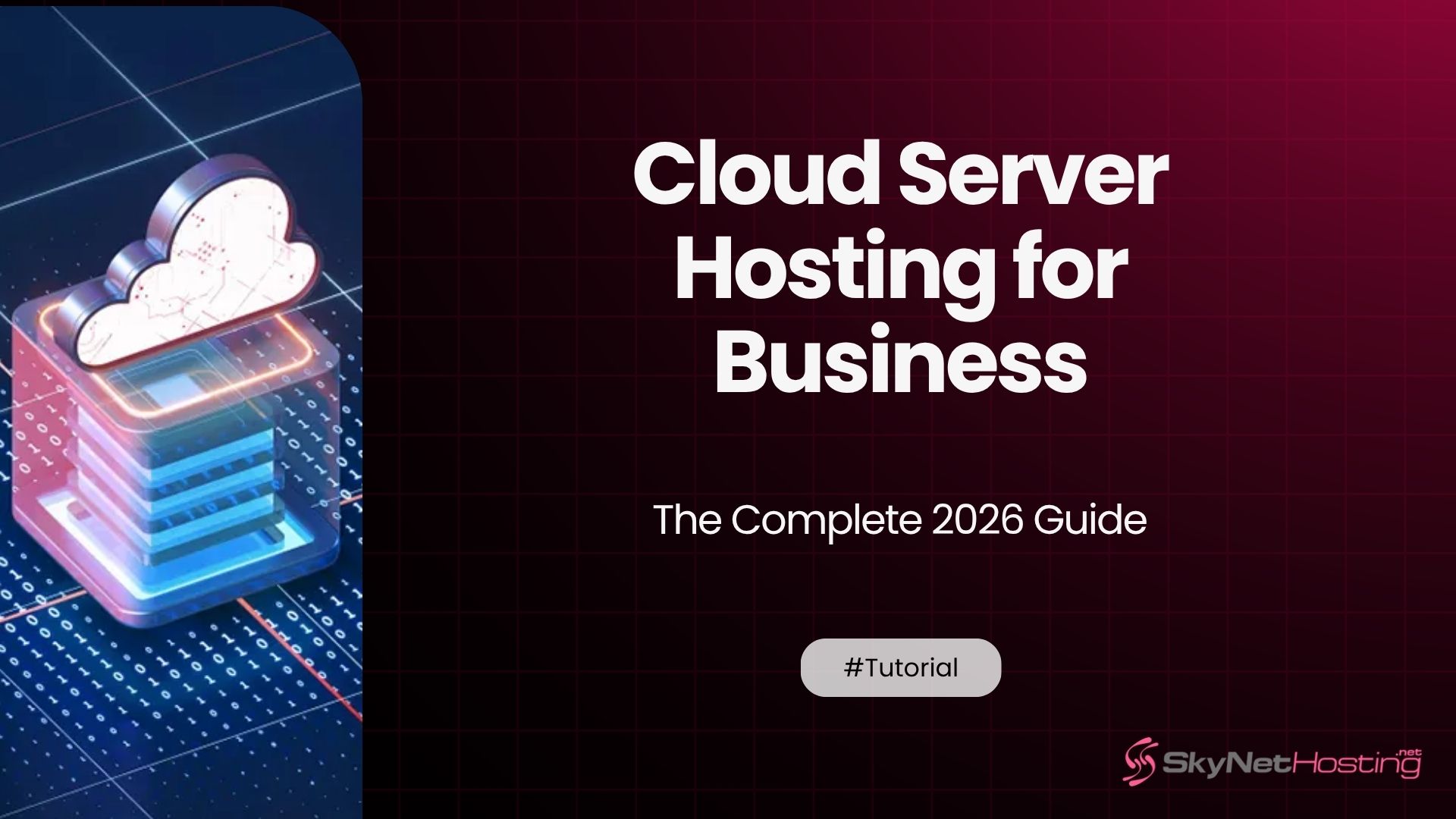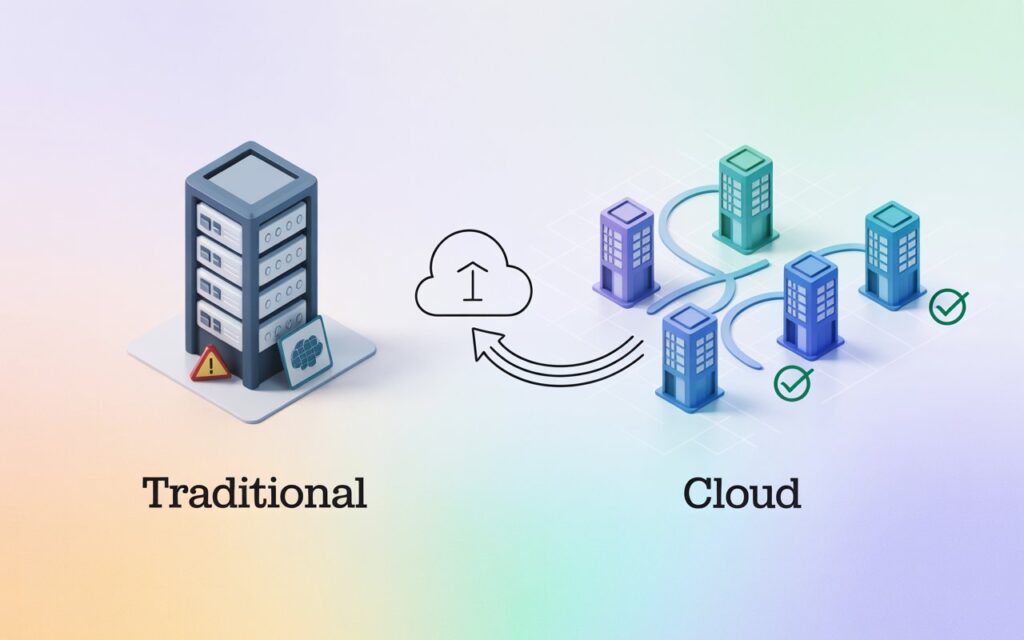
Cloud Server Hosting for Business – The Complete 2026 Guide
TL;DR
- Cloud server hosting uses virtualized, distributed infrastructure to deliver scalable resources and improved uptime compared to traditional single-server solutions, supporting websites and apps that need reliability and rapid growth.
- Businesses benefit from flexibility, pay-as-you-go pricing, automated scaling, and 99.9%+ uptime through data redundancy and load balancing across multiple servers.
- Cloud platforms offer enhanced performance, built-in security, global accessibility for remote teams, and cost-effective scalability ideal for eCommerce, SaaS, and CRM applications.
- Types of cloud hosting include public, private, hybrid, and managed VPS solutions; managed plans offer expert administration, while self-managed hosting grants full control and customization.
- Choosing the right provider means prioritizing NVMe SSD storage, global data center locations, 24/7 technical support, strong SLAs, seamless tool integrations, and robust security/compliance features.
- Skynethosting.net stands out with 25+ global data centers, managed VPS/dedicated cloud options, enterprise-grade NVMe storage, CloudLinux, LiteSpeed performance, and round-the-clock expert support for business growth.
If you’re running a business online, you’ve probably heard the term “cloud hosting” thrown around. Maybe you’re wondering if it’s time to make the switch from your current setup. Or perhaps you’re just starting out and trying to figure out which hosting option makes the most sense.
After working in the hosting industry for over a decade, I’ve seen businesses of all sizes struggle with this decision. The good news? Cloud server hosting has evolved dramatically, and it’s now more accessible and affordable than ever before.
This guide will walk you through everything you need to know about cloud server hosting for business. We’ll cover what it is, why it matters, how to choose the right provider, and what you should watch out for. By the end, you’ll have a clear understanding of whether cloud hosting is the right move for your business.
What Is Cloud Server Hosting for Business?

Definition and how it differs from traditional hosting
Cloud server hosting uses virtualized infrastructure spread across multiple physical servers to host your website or application. Unlike traditional hosting where your site lives on a single server, cloud hosting distributes your data across a network of interconnected servers.
Think of it this way: traditional hosting is like renting a single apartment. If something goes wrong with that building, you’re stuck. Cloud hosting is more like having apartments in multiple buildings across a city. If one has issues, you automatically move to another without any disruption.
The key difference lies in resource allocation. Traditional shared hosting means you’re competing with other websites for the same server resources. With cloud hosting, you get dedicated virtual resources that can scale up or down based on your needs.
How businesses use cloud servers for websites and applications
Businesses leverage cloud servers in countless ways. E-commerce stores use them to handle traffic spikes during sales events. SaaS companies rely on cloud infrastructure to deliver their applications to customers worldwide. Marketing agencies host multiple client websites on scalable cloud platforms.
I’ve worked with a retail client who saw their traffic increase by 400% during Black Friday. On traditional hosting, their site would have crashed. With cloud hosting, the infrastructure automatically scaled to handle the load, and they didn’t lose a single sale.
Why Businesses Are Moving to Cloud Hosting
Flexibility and scalability
One of the biggest advantages I’ve seen businesses appreciate is scalability. You can start small and grow your resources as your business expands. Need more storage? Add it instantly. Experiencing a traffic surge? Scale up your bandwidth in minutes.
This flexibility extends to testing and development too. You can spin up new environments to test updates without affecting your live site, then deploy changes seamlessly.
Improved uptime and reliability
Traditional hosting typically offers 99% uptime, which sounds great until you realize that means roughly 3.65 days of downtime per year. Cloud hosting providers often guarantee 99.9% or even 99.99% uptime through data redundancy and security measures.
When one server fails, your site automatically switches to another. This distributed architecture means your business stays online even during hardware failures or maintenance windows.
Pay-as-you-grow pricing benefits
Cloud hosting follows a pay-as-you-go model. You only pay for the resources you actually use, rather than paying for capacity you might not need. For growing businesses, this can mean significant cost savings.
A startup client of mine reduced their hosting costs by 40% in their first year by switching to cloud hosting. They weren’t paying for unused resources anymore, and they could scale up during busy periods without committing to expensive long-term plans.
How Does Cloud Hosting Work for Businesses?
Virtualization and distributed resources
Cloud hosting uses virtualization technology to create virtual servers from physical hardware. Multiple virtual machines (VMs) run on the same physical server, each operating independently with its own operating system and resources.
Your website doesn’t live on just one physical server. Instead, it’s distributed across multiple servers in different locations. This distributed approach is what makes cloud hosting so resilient and fast.
Load balancing and resource allocation
Load balancing distributes incoming traffic across multiple servers to prevent any single server from becoming overwhelmed. When one server reaches capacity, the system automatically routes new requests to other available servers.
Resource allocation happens dynamically. If your site needs more processing power during peak hours, the system automatically allocates additional CPU resources. When traffic drops, those resources become available for other tasks.
Cloud server management and automation
Modern cloud hosting platforms include automation tools that handle routine tasks like backups, updates, and performance monitoring. You can set policies for automatic scaling, so your infrastructure adjusts without manual intervention.
Managed cloud hosting takes this further by having technical experts handle server configuration, security patches, and optimization. This lets you focus on your business rather than server administration.
What Are the Key Benefits of Cloud Server Hosting for Businesses?

Enhanced performance and uptime
Cloud infrastructure delivers consistently fast performance through distributed resources and content delivery networks (CDNs). Your website loads quickly for visitors regardless of their location because content is served from the nearest data center.
Uptime and performance monitoring tools alert you to potential issues before they become problems. Most cloud providers maintain multiple data centers with redundant systems to ensure your site stays online.
Built-in data security and backups
Security features like firewalls, DDoS protection, and SSL certificates come standard with most business cloud hosting solutions. Regular automated backups mean your data is protected even if something goes wrong.
I’ve seen businesses recover from ransomware attacks because their cloud provider maintained off-site backups that attackers couldn’t access. That level of protection would have cost thousands with traditional hosting.
Global accessibility for remote teams
Cloud hosting supports remote work perfectly. Your team can access applications and data from anywhere with an internet connection. Collaboration tools, CRM systems, and project management platforms all run smoothly on cloud infrastructure.
This global accessibility also benefits your customers. With servers in multiple locations, visitors get fast loading times whether they’re in New York or Tokyo.
Cost efficiency and easy scalability
You avoid the capital expenses of buying and maintaining physical servers. No need for in-house IT infrastructure or the staff to manage it. Cloud providers handle hardware upgrades, security updates, and system maintenance.
Hosting scalability means you’re not locked into fixed plans. Start with basic resources and expand as needed. This flexibility is especially valuable for businesses with seasonal traffic patterns or rapid growth.
Which Type of Cloud Hosting Is Best for Your Business?
Public cloud vs private cloud vs hybrid cloud
Public cloud services like AWS, Google Cloud, or Azure share infrastructure among multiple customers. This keeps costs low while still providing excellent performance and reliability.
Private cloud gives you dedicated infrastructure, offering more control and customization. It’s ideal for businesses with specific security requirements or regulatory compliance needs.
Hybrid cloud deployment combines both approaches. You might keep sensitive data on private servers while using public cloud for your customer-facing applications. This gives you flexibility while maintaining security where it matters most.
VPS cloud servers for growing businesses
Cloud VPS hosting for enterprises offers a middle ground between shared hosting and dedicated servers. You get dedicated virtual resources at a fraction of the cost of physical servers.
A VPS gives you root access to customize your server environment while the provider handles physical hardware maintenance. It’s perfect for businesses that have outgrown shared hosting but don’t need full dedicated servers yet.
Managed cloud solutions vs self-managed hosting
Managed cloud hosting means your provider handles server administration, security updates, and technical optimization. You get expert support without hiring in-house server administrators.
Self-managed hosting gives you complete control but requires technical expertise. You’re responsible for server configuration, security patches, and troubleshooting. It’s more affordable but demands time and knowledge.
For most businesses, managed solutions make more sense. The time you save and expertise you gain access to typically outweigh the cost difference.
How to Choose the Right Cloud Hosting Provider
Performance and server speed
Look for providers using NVMe SSD storage rather than traditional hard drives. NVMe is significantly faster, delivering better performance for your applications and websites.
Check what web server software they use. LiteSpeed and similar modern web servers offer superior performance compared to older options like Apache.
Data center locations and redundancy
Choose a cloud server provider comparison that includes multiple data center locations. Having servers close to your target audience reduces latency and improves loading times.
Verify that providers maintain redundant systems across different geographic locations. This ensures your site stays online even if an entire data center goes offline.
Technical support and SLAs
Look for 24/7 technical support with multiple contact methods. Email support is fine for non-urgent issues, but you want live chat or phone support available when problems arise.
Read the Service Level Agreement (SLA) carefully. What uptime do they guarantee? What compensation do you receive if they don’t meet it? These details matter when downtime could cost you sales.
Integration with business tools and apps
Your hosting should integrate smoothly with the tools you already use. Whether that’s WordPress, Shopify, custom CRM systems, or marketing automation platforms, compatibility matters.
Look for one-click installations and pre-configured environments for popular applications. This saves setup time and reduces the risk of configuration errors.
How Cloud Server Hosting Supports Business Growth
Hosting scalability during traffic spikes
Cloud infrastructure automatically handles traffic increases without manual intervention. When you launch a marketing campaign or experience viral growth, your site stays responsive.
I’ve worked with clients who went from 1,000 daily visitors to 100,000 overnight after media coverage. Cloud hosting handled the surge seamlessly while traditional hosting would have crashed.
Easy deployment for eCommerce, SaaS, and CRM apps
Cloud platforms offer optimized environments for specific applications. Whether you’re running WooCommerce, a custom SaaS application, or CRM software, you can deploy quickly with pre-configured templates.
This speeds up time-to-market for new products and services. Instead of spending weeks setting up infrastructure, you can launch in days or even hours.
Automation and AI integration for enterprise operations
Modern cloud hosting platforms support automation tools that streamline business operations. Automated backups, scheduled maintenance, and performance optimization happen without manual oversight.
Cloud infrastructure as a service (IaaS) provides the foundation for AI and machine learning applications. As your business adopts these technologies, your hosting can support them without major infrastructure changes.
Common Challenges with Cloud Hosting and How to Overcome Them
Security and compliance management
While cloud providers offer robust security, you’re still responsible for application-level security. Implement strong passwords, regular security audits, and employee training to prevent breaches.
For businesses in regulated industries, verify that your provider meets necessary compliance standards like HIPAA, PCI-DSS, or GDPR. Many providers offer compliance-certified infrastructure specifically for these requirements.
Data migration challenges
Moving from traditional hosting to cloud hosting can be complex, especially with large databases or custom configurations. Plan your migration carefully and schedule it during low-traffic periods.
Most managed cloud providers offer migration assistance. They’ll handle the technical details of moving your data and applications, minimizing downtime and reducing the risk of errors.
Managing costs effectively
Cloud hosting’s flexibility can lead to unexpected costs if you’re not careful. Monitor your resource usage regularly and set up alerts when spending approaches certain thresholds.
Right-size your resources by analyzing actual usage patterns. You might discover you’re paying for capacity you don’t need, or that adjusting your configuration could improve both performance and cost efficiency.
Why Skynethosting.net Is Ideal for Business Cloud Hosting
25+ global data centers for fast performance
Skynethosting.net operates data centers across North America, Europe, Asia, Africa, and Australia. This global presence means your website loads quickly for customers regardless of their location.
With locations in major markets like the USA, UK, Germany, Singapore, and Australia, you can position your hosting close to your primary customer base while maintaining redundancy across regions.
24/7 technical support and monitoring
Access to round-the-clock support means help is available whenever issues arise. The technical team monitors server performance continuously, often resolving problems before customers notice them.
For resellers and agencies managing multiple client websites, Skynethosting.net offers end-user support. This means your clients get expert assistance directly, saving you time while maintaining your brand presence.
Managed VPS and dedicated cloud plans
Whether you need affordable business cloud hosting on a VPS or full dedicated cloud servers, Skynethosting.net offers flexible options. All plans include NVMe storage for superior performance compared to standard SSDs.
Managed services take care of server administration, security updates, and optimization. You get enterprise-level infrastructure without needing in-house technical expertise. The platform also includes LiteSpeed web servers and CloudLinux for enhanced stability and performance.
Take Your Business to the Next Level with Cloud Hosting
Cloud server hosting for business has evolved from a luxury to a necessity for companies serious about growth and reliability. The combination of scalability, performance, cost efficiency, and global accessibility makes it the clear choice for modern businesses.
The benefits are compelling: better uptime, faster loading speeds, automatic backups, and the flexibility to scale as you grow. Whether you’re running an e-commerce store, SaaS application, or corporate website, cloud hosting provides the foundation you need to succeed.
Choosing the right provider matters tremendously. Look for proven reliability, multiple data center locations, responsive support, and pricing that scales with your business. The difference between a good and great cloud hosting provider can significantly impact your business operations and bottom line.
Cloud hosting isn’t just about where your website lives. It’s about building a resilient, scalable infrastructure that supports your business goals. As technology continues advancing, cloud hosting will become even more powerful and accessible.
Ready to experience the benefits of professional cloud hosting? Explore enterprise-ready cloud hosting plans at Skynethosting.net and discover how the right infrastructure can transform your business operations. With 20 years of experience, 25+ global data centers, and 24/7 expert support, Skynethosting.net provides the reliability and performance your business deserves.
FAQs
What is cloud server hosting and how does it differ from traditional hosting?
Cloud server hosting uses virtualized infrastructure spread across multiple physical servers, allowing for scalable, reliable service. Unlike traditional hosting on a single server, cloud hosting distributes resources, boosting uptime and performance, and letting businesses easily scale up or down as needed.
Why are businesses moving to cloud hosting?
Businesses move to cloud hosting for its scalability, high uptime, and cost efficiency. The model provides pay-as-you-grow pricing, automatic resource scaling during spikes, and reliable uptime guarantees—making it well-suited to growing businesses and unpredictable workloads.
How does cloud hosting maintain uptime and performance?
What are the key business benefits of cloud hosting?
Cloud hosting delivers enhanced security, automatic backups, global accessibility for remote teams, and easy scalability. It allows businesses to avoid buying physical servers and guarantees faster website loads and resilient operation, supporting business growth efficiently and securely.



